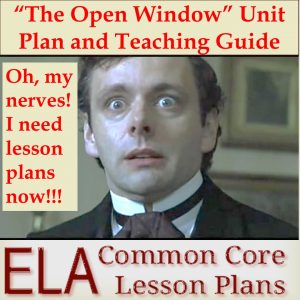Although you’d be a much better teacher after reading my witty and engaging blog post introduction, I won’t be offended if you just download this pdf “Open Window” lesson plan, make copies, and go on your merry way: Theme lesson plan for “The Open Window”
Mr. Nuttel endeavoured to say the correct something which should duly flatter the assistant principal during the observation without unduly discounting the head principal that was to come. Privately he doubted more than ever whether his lesson plans during formal visits on a succession of administrators would do much towards helping the nerve cure which he was supposed to be undergoing.
The only thing that would calm his nerves would be great “Open Window” lesson plans. But he didn’t come to this website and he didn’t have any, so when the head principal arrived, Mr.Nuttel grabbed wildly at his red pen and seating chart; the hall door, the carpeted corridor, and the front gate were dimly noted stages in his headlong retreat.
He was fired that very day. I don’t want that to happen to anyone else. That’s why I created “Open Window” lesson plans you can download.
“The Open Window” Summary
Framton Nuttel suffers from a nervous disorder. We know this because he talks about it incessantly. Vera is a self-possessed teenaged story-teller. When a self-possessed teenaged story-teller sinks her story-telling claws into an emotionally unstable visitor, things get interesting.
As the two wait for the appearance of Vera’s aunt, for whom Nuttel has a letter of introduction, Vera tells the story of her uncle’s tragic death while hunting and the effect it’s had on her aunt who still awaits his return. The aunt appears and converses with the guest. She talks about and looks out the open window for the arrival of her husband. Nuttel pities the poor woman.
Then the husband and his hunting mates appear, causing Nuttel to bolt from the house and into the road, at which point Vera begins an incredulous tale about Nuttel and a pack of pariah dogs on the banks of the Ganges.
Apparently, Vera tells a lot of stories that lack veracity.
“The Open Window” Analysis
An analysis of “The Interlopers” produces the following discussion topics and observations:

High interest story with great critical thinking lesson plans. Tons of stuff for just $4.75.
- Theme - Theme lesson plan for “The Open Window”
- Irony – Saki delights readers with irony. “The Open Window” is no exception. From the name of the story’s protagonist, Vera, to Nuttel’s motivation for coming to visit, irony abounds.
- Symbolism – An open window often represents truth, openness, and honesty. That’s not exactly how things play out in this tale, as the window represents deceit and trickery. There’s also the heavy-handed symbolism in Nuttel’s name. Oh and Vera means truth, too. Talk about deception.
- Humor/Satire – Irony is Saki’s main tool. Vera specializes in hyperbole and a bit of meiosis at the right time.
- Suspense. Saki applies the primary methods for building suspense as he satirizes the suspense stories of the Romantic period.
Characterization. Saki deftly reveals the personality of the story’s two primary characters—Vera and Framton
Point of View. I wonder what Framton is thinking during this visit.
Theme Analysis ELA Standards Taught
- RL.9-10.1 Cite strong and thorough textual evidence to support analysis of what the text says explicitly as well as inferences drawn from the text.
- RL.9-10.2 Determine a theme or central idea of a text and analyze in detail its development over the course of the text, including how it emerges and is shaped and refined by specific details; provide an objective summary of the text.
- Analyze how complex characters (e.g., those with multiple or conflicting motivations) develop over the course of a text, interact with other characters, and advance the plot or develop the theme.
- L.9-10.6 Acquire and use accurately general academic and domain-specific words and phrases, sufficient for reading, writing, speaking, and listening at the college and career readiness level; demonstrate independence in gathering vocabulary knowledge when considering a word or phrase important to comprehension or expression.

Speak Your Mind